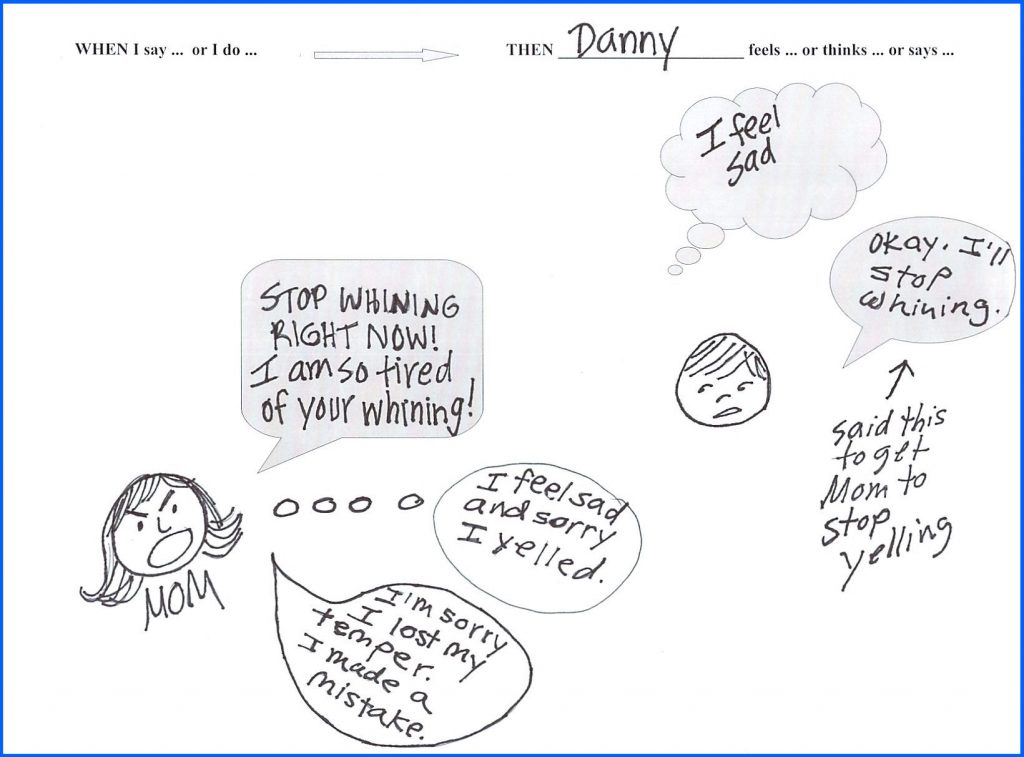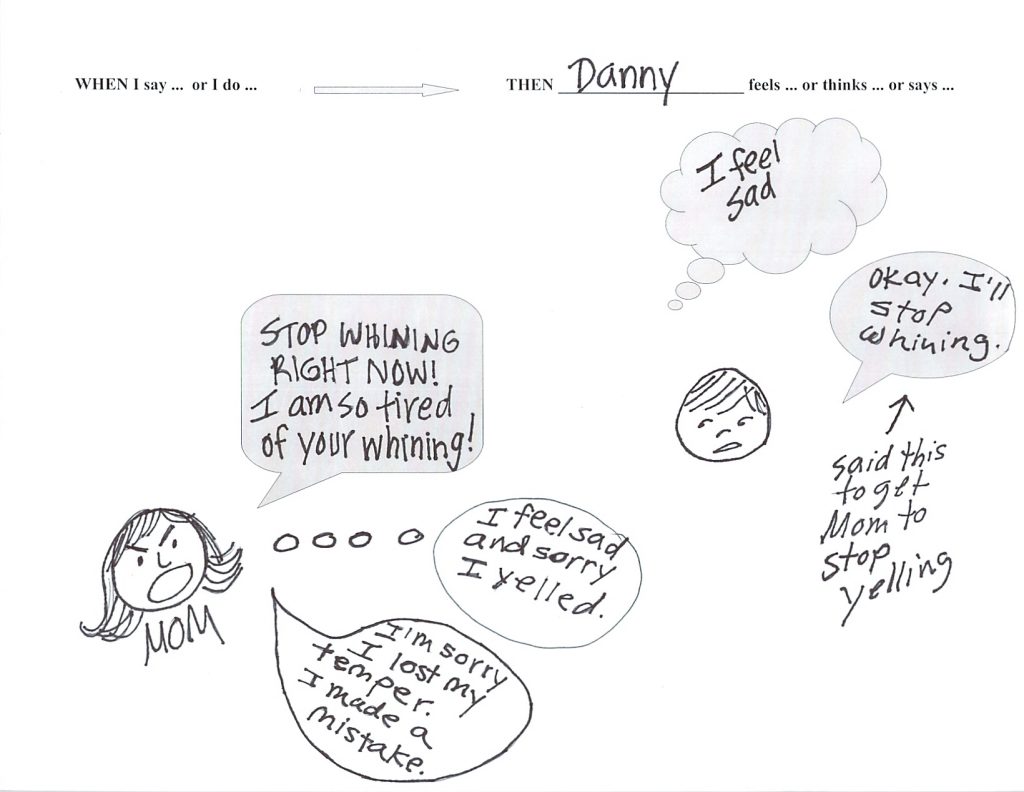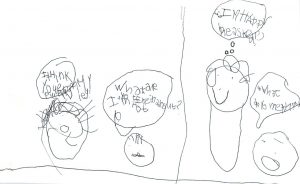

What to Do When You Lose Patience
with Your Child with Autism
Maybe it’s a bad day or maybe your kid sets you off. Regardless, you will sometimes lose your cool with your autistic child. Here are ten tips for what to do when this happens!

By Jenny Burke — June 26, 2020
Google “autism meltdown” and you’ll get lots of results, but nearly all of them have to do with a child melting down. This post is about when the parent loses it!
This blog gets personal. While it’s embarrassing for me, I think we “older parents” do the younger ones a disservice when we fail to share the less pretty parts of raising an autistic child. Parents are human and are bound to screw up now and again. Hopefully, for those wracked with guilt over losing it with a kiddo, they will find some reassurance and useful advice here.
Before diving in: IT IS NEVER OKAY TO HIT A CHILD.
Autistic kids are at greater risk of abuse than neurotypical kids. If you have hit your child, or worry you might, you must seek help immediately. If you do not know where to go, call the National Parent Helpline: 1-855-4A PARENT (1-855-427-2736).
I really love the National Parent Helpline slogan: “Asking for Help is a Sign of Strength.” AMEN TO THAT!
Okay, here we go:
What to Do When You Lose Patience with Your Autistic Kid
1. Don’t be too hard on yourself.
You, my friend, have so much on your plate right now. It’s hard enough in “normal” times to juggle everything and now parents, especially working and single parents are just trying to survive. Parents of kids with autism or other special needs are additionally trying to make remote special education and therapies work.
And let’s face it: kids with autism often have challenges with change, uncertainty, and anxiety. For those who are young or who have cognitive challenges, they do not get why it is they can’t go to school, why they need to wear a mask, and so on. As a result, many are melting down much more these days. There’s fires going on in households all over this country.
I wish I could give you a huge hug, or even better, come over to clean your house and watch your kids for a few hours so you could get a true break! While I can’t do that, I can give you this: forgiveness. Please, please believe me when I say it’s time to forgive yourself. Chances are great your child is going to be okay, despite your melt down. And yes, you probably will lose your patience again, from time to time.
Take a big breath, hit the reset button, and read on!
2. That said, recognize that losing it often is not good for your child, and is not effective parenting.
Constantly losing your patience with your autistic kid is not good for the child, or for your relationship with them. Further, lots of yelling can be downright damaging.
Also, it’s not an effective form of parenting; i.e., snapping at your kid because of something they said or did probably won’t change that behavior. All my less-than-pretty overreactions sure did not make a positive difference in my son’s problem-solving and coping behaviors. Even when you actually have a really legitimate reason to be upset, such as when a child runs into a street, screaming probably won’t prevent your child from repeating the behavior that upset you.
And last, when you blow-up at your child, you are unintentionally modeling negative behaviors such as an unpleasant tone of voice (or worse, screaming), overreacting to something or someone, and not managing stress. Whoops!
Therefore, if you have a super quick trigger, you really need to figure out how to get yourself in a better place so that you are less likely to lose it. Let’s face it, all your stressors are not going away any time soon, ugh. More on how to do this below.
3. Apologize and take responsibility.
Face it: you messed up. Please do not move on as if this didn’t happen. Make an apology to your child that’s genuine and unconditional. No “buts”! Saying angrily to a child, “I’m sorry I acted like that, but you pushed me too far,” is not an apology because actually you are blaming your child for your poor behavior. If you need to, wait until you are truly calm and can own up to your own behavior. Taking responsibility, by the way, is great modeling for your child!
When you apologize, be specific. Rather than a generic, “I’m really sorry I acted that way,” say, “I’m really sorry that I yelled at you. I was way too loud. I overreacted to what you said.” Specifically describing behavior helps your child understand what exactly it is that you are sorry about and helps them learn important concepts like “overreact.” (Describing is a really great in-the-moment teaching strategy to build language!)
4. Correct anything you said in the heat of the moment that isn’t actually true.
Do not assume your child will realize that you didn’t mean what you said when you were angry. Many autistic kids think in a very concrete or black-and-white way and are at risk for internalizing things you say. (This is true for all kids.) So for the mom who said to a daughter, “I am so done!” that mom needs to make sure her daughter understands that in reality Mom is not giving up on her daughter, nor does Mom want to do something drastic like move out or kick the daughter out.
By the way, if you tend to say the following types of things in the heat of the moment: “You’re bad/worthless/not worth the trouble of having”; “I’m sorry I had you”; etc., STOP saying those sorts of things! You are harming your child when you do that. I say this with the greatest of urgency: you must seek help for both your child and yourself.
5. Tell your child you love them and you think they’re a good kid.
Again, do not assume your child knows this! To drive this point home, I’m going to throw my husband under the bus. He’s generally a great dad, who deeply loves his kids, but Tim had very little patience when it came to middle school math. Our autistic child actually believed that Tim’s constant irritation during math meant his dad did not love him anymore. But he did not share that with Tim or me — we had no idea he was thinking that, yikes!
Thankfully, Danny shared his belief with his psychologist who promptly told me. As a result, Tim was able to reassure him that he loved him very much. (He also resigned as the family math tutor!) To this day I shudder to think about what if we had never found out.
So please, learn from what happened with Danny and his Dad. Whenever you lose your cool, be sure to tell your child you love them! Say something like, “I want to make sure you know that I love you and think you are a good kid. Do you understand that I love you and think you are a good kid?”
Really, do this even if your child is not autistic.
6. Take a little time to go over what happened.
Apologizing is great, but I’d like you to take this a step further. Grab even just a few minutes with your child to “debrief” on what happened. As painful as it can be for you, give your child a chance to tell you how they felt when you blew up. When it is your turn, describe what set you off, but if it was something your child said or did, be neutral — no blaming your child for your blow-up and make clear you overreacted. You can even talk about “next time” and what you will do to try to stay calm. If you child’s behavior set you off, you can also discuss what they can do the “next time” as well.
While you do not have to do this, I found drawing a cartoon of what happened really helped my son and I communicate. The talking balloons and thinking bubbles were great for helping him understand my point of view and to share feelings. At the end of this post is a super cute cartoon he created during one of our “debriefs.”

Danny + I made visuals together on all kinds of things. For this one I created a “form” using my computer. The purpose of the “When I…” heading was to help Danny understand cause/effect of behavior.
Here is a cartoon we made after I yelled at my kiddo for whining about his stopwatch being “gone forever.” (It was under his blanket.) If you disapprove of my use of the word whining, you definitely have a point. It is harsh-sounding. The bottom line is that in that moment when the stopwatch was “gone forever,” I snapped. I was stressed, busy, and tired. I also felt “up to here” with my child’s constant melt downs over what I viewed as small, fixable problems.
Doing the visual together gave me a “re-do” with my son, and gave him the chance to share with me how hurt he was when I yelled at him. While doing a debrief will not magically erase hurt feelings and quickly resolve all negative behaviors (including yours!), I do believe that it can really help.
By the way, I am a huge fan of parents using cartoon-style visuals to help a child learn to replace unproductive behaviors such as communicating by screaming, with more functional communication and coping behaviors. To learn more, check out Tips & Topics, “After-the-Moment Teaching.”
7. Beginning today, identify and practice strategies that will help you calm down; if possible involve your child.
Identifying and practicing strategies on a daily basis (when you are not feeling upset) will help you the next time you get upset. My favorite strategy is taking slow, deep breaths. Honestly, I used to think this was a silly strategy. But last Spring I decided to give this a try. Fast forward to July, I became a believer when I was in a life and death crisis situation and deep breathing kept me together. There is science behind this: deep breathing actually helps bring down your elevated heart rate and blood pressure. This link provides useful info on the benefits of and how to practice deep breathing.
Every day, grab even a few minutes to close your eyes and take 5-10 slow, deep breaths. Even better, practice with your child each day. Say something like this to your kiddo, “We are going to practice deep breathing each day. That way, whenever you or I get upset, we can breathe to feel better.” This is really terrific modeling for your child: being proactive to solve problems. (By the way, I have actually taken the hands of each of my children (one is autistic and one is neurotypical) when they were upset and said, “Let’s breathe together.” Breathing slowly together really helps them calm down.)
Another strategy I have found personally useful is to repeat a mantra quietly to myself over and over as needed. Mine are: “This will pass” and “I’m OK.” Again, practice when you are calm. Here is some research on the benefits of repeating a mantra. Again, including your child, if possible, will help them experiment with using a mantra to self soothe. (For more on using mantras with an upset child, check out our free resource Tips & Topics, “Helping a Child Learn to Cope with ‘No.’”)
The next time you do get upset, regardless of your strategies — deep breathing, repeating a mantra, giving yourself a “timeout” by walking away, plugging into music, looking at your phone, etc. — if possible tell your child what you are doing to calm down. Something like, “I’m really upset right now. So to calm myself down, I’m going to listen to some music. We’ll talk about this later.” Or, “I’m upset right now. I’m going to take some slow deep breaths.” (If your child has a language impairment, your child’s Speech-Language Pathologist can help you with your wording.) When you describe to your child how you are taking steps to calm down, and then you do actually calm yourself down, you are doing very important “in-the-moment teaching.”
8. Get emotional support to help you cope with all that’s going on in your life, including raising an autistic child.
I realize you are insanely busy, but you must carve out time for emotional support. Sure, talk to your mom, sibling or friend. But this might not be enough, especially if they do not have an autistic child of their own. Joining a local parent group or Facebook support community will connect you with other parents who truly get what you are going through. Additionally, you might pick up some useful tips and tricks.
If you are feeling overwhelmed to the point you are struggling to get through the day, look into therapy. Parents: there is no shame in getting some professional help, and if need be, taking a medication like an antidepressant. I am speaking from experience. There have been times when I got really honest with myself and recognized I could no longer cope without some professional help. You don’t have to do it forever, just long enough to get yourself back on track.
Because of the pandemic, many support groups and therapists now offer remote appointments which can save you a lot on time. Remote therapies are sometimes cheaper as well.
And speaking of money, I get it, I know many of you do not have insurance coverage for mental health services. But investing in your mental health is critical, especially if you are in crisis. Check out this link on how to find affordable therapy, if your financial resources are low.
If you are feeling suicidal, please, please, immediately get help! Call 800-273-8255 or go here.
Make emotional support a priority. Do this for your health and because you will be better able to handle all the stresses of your life.
9. If you are losing your patience because of your autistic child’s behavior, talk to your child’s IEP team.
It’s not your child’s fault. Whatever it is they do that is setting you off is the result of their own stress, fear, sensory challenges, inability to communicate functionally or problem-solve, anxiety, depressions, etc. But it’s also very understandable for you to feel impatient at times. Speaking for myself, I fully got it that it was the way my kiddo’s brain was wired that caused him to constantly cry and scream about things that felt difficult or disappointing to him. I knew he could not help it: problems that seemed little to me (like losing a dang stopwatch in his bedroom!) felt SO huge to him. But even though I understood, I still had my moments of feeling super frustrated and annoyed with him.
Just like in my case, you cannot be expected to go it alone when it comes to these challenging behaviors. Do what I did and advocate for your child’s IEP to include goals and objectives for helping your child learn to “replace unproductive behaviors with more productive, functional behaviors.” Use that wording!
If your child is regularly engaging in unproductive behaviors at home, chances are excellent they are also doing these things during the school day (be that in school or at home). Behaviors that interfere with learning and making progress on IEP goals and objectives should be addressed in an IEP (Individualized Education Plan). Use that wording, too, with the team!
You can request an IEP meeting (a remote meeting is fine) to review an IEP. I highly recommend you tap into the very useful special ed resources at Wrightslaw. While you need to be empathic and understanding of how incredibly difficult it is right now for school staff, that does not mean you can’t advocate for your child to ensure they continue to make progress on IEP goals and objectives! While for certain kids, they will need some kind of outside therapy to make progress on unproductive behavior, a lot can be accomplished by school professionals to help a child.
Further, ask the team what you can be doing at home to help your child get better at functional communication and coping. Note that for many kids, challenging behaviors are a form of communication. Take a look at MooBoo’s Talking about Thinking, which is all about helping kids improve their expressive communication skills, particularly when it comes to their wants, needs, and strong feelings like anger and anxiety. All three of our Thinking Series products are designed to help kids strengthen coping and problem-solving skills in addition to expressive communication, all of which can help lessen unproductive behaviors.
Also, I recommend you constantly “catch” (i.e., make a big deal out of your child’s positive behavior for the purpose of reinforcing it) your child engaging in productive, functional behaviors such as being flexible, asking for help, sticking with something that is hard, and making an effort to problem-solve or otherwise be independent. Regular reinforcement of even brief instances of positive behavior can truly add up to help your child make progress! You’ll find a free resource on reinforcement in MooBoo’s Tips & Topics.
10. If you are running thin on patience because your child’s behavior is often out of control, aggressive, or self-harming, or there is a change in your child’s behavior, seek professional, mental health help for your child.
Some kiddos need more than what can be provided through school. This was true for my child who went through a long phase of intense melting down and was prone to anxiety. Your child’s behavior might be a warning sign. Kids with autism are vulnerable to depression and anxiety. The upheaval and uncertainty with the pandemic makes them even more vulnerable. It’s critical you’re monitoring your child. This is true for siblings as well. I think this is an excellent resource for parents on the warning signs for depression, anxiety, or other mental health concerns when it comes to kids with autism. It’s part of a larger COVID-19 Toolkit to support individuals with autism that includes very helpful, specific strategies.
Again, I recognize families are so stressed right now, and I feel heart-broken that way too many are financially strapped. However, this is a “pay now versus paying even more later.” Research shows that children and adolescents fare so much better in the long term when their mental health needs are addressed early on. Here is a resource I found on finding autism supports for families on public assistance. Here is a fact sheet on finding affordable services for an autistic child. Do some digging locally as well as some communities do have free clinics and other resources.

I LOVE this creation by Danny, but I truly have no idea what it says!
MooBoo is here to help! Our mission is to help adults help kids with autism make progress. We’ve got free resources for parents in Tips & Topics. Find our affordable, parent-friendly digital products here.
We can learn from and support each other! Please share your thoughts on the above as well as your own advice on what to do when you lose patience with your autistic child.
Want to know when we post something new? Subscribe here.
Leave A Comment
Please be sure you understand our Comment Policy before posting a comment.You must be logged in to post a comment.